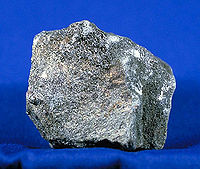
Photo from wikipedia
The anomalously high electrical conductivities (~0.1 to 1 S/m) in deep mantle wedge regions extensively detected by magnetotelluric studies are often associated with the presence of fluids released from the progressive… Click to show full abstract
The anomalously high electrical conductivities (~0.1 to 1 S/m) in deep mantle wedge regions extensively detected by magnetotelluric studies are often associated with the presence of fluids released from the progressive dehydration of subducting slabs. Epidote minerals are the Ca-Al-rich hydrous silicates with huge stability fields exceeding those of amphibole (>70–80 km) in subducting oceanic crust, and they may therefore be transported to greater depth than amphibole and release water to the mantle wedge. In this study, the electrical conductivities of epidote were measured at 0.5–1.5 GPa and 573–1273 K by using a Solartron-1260 Impedance/Gain-Phase Analyzer in a YJ-3000t multianvil pressure within the frequency range of 0.1–106 Hz. The results demonstrate that the influence of pressure on electrical conductivity of epidote is relatively small compared to that of temperature. The dehydration reaction of epidote is observed through the variation of electrical conductivity around 1073 K, and electrical conductivity reaches up to ~1 S/m at 1273 K, which can be attributed to aqueous fluid released from epidote dehydration. After sample dehydration, electrical conductivity noticeably decreases by as much as nearly a log unit compared with that before dehydration, presumably due to a combination of the presence of coexisting mineral phases and aqueous fluid derived from the residual epidote. Taking into account the petrological and geothermal structures of subduction zones, it is suggested that the aqueous fluid produced by epidote dehydration could be responsible for the anomalously high conductivities in deep mantle wedges at depths of 70–120 km, particularly in hot subduction zones.
Journal Title: Journal of Geophysical Research
Year Published: 2017
Link to full text (if available)
Share on Social Media: Sign Up to like & get
recommendations!